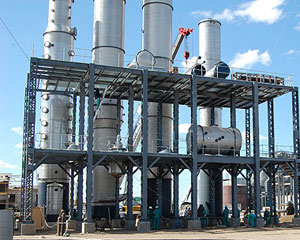
Greenfuel is fighting off allegations that its Chisumbanje ethanol plant is threatening human, animal and aquatic life due to heavy pollution of water sources.
By VENERANDA LANGA
Environmental Management Agency (EMA) director general Mutsa Chasi about two weeks ago appeared before the Parliamentary Portfolio Committee on Youth, Indigenisation and Economic Development saying the ethanol manufacturer was releasing toxic ethanol effluent into water sources.
He said that the plant was operating illegally without an Environmental Impact Assessment certificate.
Chasi said land, human, animal and aquatic life were severely threatened to the extent that in 30 years’ time there would be total extinction of plants and fish in the affected areas.
The Parliamentary Portfolio committee directed EMA to shut down Greenfuel or issue them with US$5 000 daily fines for environmental breaches.
But, spokesperson for the ethanol manufacturing company Nicole Mollet, said Greenfuel had satisfied all requirements for an EIA certificate. She said the plant was unhappy with the hefty charges EMA required for the certificate.
“We would be happy to show you our licences and relevant invoices issued by EMA to prove that the allegations that we are noncompliant are unfounded,” Mollet said.
- We’re ready to defend tittle: Platinum Queens
- Ngezi Platinum maintain top spot with big win
- GreenFuel looks to build on impressive debut season
- The ugly side of evictions as Chisumbanje villagers are forced to make way for tycoon
Keep Reading
“At the commencement of the project and in line with the legislative requirements of the Environmental Management Act 20:27, Greenfuel approached the Environmental Management Agency [EMA] for guidance towards fulfilling the requirements of an Environmental Impact Assessment.”
She said the full Environmental Impact Assessment report was submitted to EMA on February 4 2011 and, in line with section 100(1) of the Act; the Director General of EMA had 60 days to consider the report and reach a decision.
“But EMA failed to respond and therefore the project was deemed approved in line with the Act,” Mollet said.
She said when working on their EIA plan, Greenfuel did extensive stakeholder consultative processes at Middle Sabi and Chisumbanje aimed at exhaustively addressing community concerns and the environmental and socio economic impact of the project.
“The project and its environmental impact have therefore been accepted and deemed approved by EMA,” Mollet said.
“However, what currently remains outstanding is a certificate which EMA has indicated will be made available at the full payment of US$866 250 which represents the EIA review fees of 1,5% of the valuation of the project.”
She said Greenfuel and EMA had entered into a payment plan, of which they had already paid over US$100 000 towards obtaining the certificate.
“It is very important to note the discrepancies between the charges in Zimbabwe versus elsewhere as they are not justified and represent a huge deterrent to investment into the country,” said Mollet.
According to figures given by Mollet, EIAs for ethanol projects in countries like Kenya cost US$27 500, Zambia US$68 750, Mozambique US$38 500, South Africa US$1 525, and Botswana only US$172.
“As a result of the EIA being in place, Greenfuel has been issued with all relevant and up to date EMA licences supporting its operations, and these include the effluent disposal, waste management and emissions licences,” she said.
But, Chasi told the committee that Greenfuel had failed to purchase a bio-digester to control the highly acidic effluent they discharged into water sources saying they did not have money.
Mollet denied the allegations saying the effluent Green Fuel discharged was not toxic.
“There is absolutely no effluent being discharged into any public rivers or waterways in Chisumbanje. The effluent being referred to is called vinasse and is a by-product of the distillation process,” she said.
“This water does not have any hazardous chemicals in it and is actually an excellent form of fertiliser which can be used in animal feed. It is diluted with other irrigation water and used to irrigate the sugarcane in the estates. Nothing goes outside of the estate and a full water quality analysis is done on the diluted water before any irrigation takes place.”
Mollet said the ethanol plant had serious economic benefits for the country as they currently employed over 4 500 people, with a prospect of employing 36 500 Zimbabweans by 2020.
EMA spokesperson Steady Kangata could not give a precise answer as to whether the environmental regulator had started charging Greenfuel the US$5 000 daily fees for breach of environmental laws as ordered by the committee.
“Check with Greenfuel if our Mutare offices have started charging them those daily fees,” he said.
“However, I can confirm that Greenfuel started the process of EIA certification but they did not finish it and we deem them as operating illegally to date as they do not have the certificate. It is cheaper for them to pollute than to get an EIA or equipment to reduce pollutants.”
EMA’s charges for environmental offences range from US$20 to US$5 000, and Kangata said people should now begin to take part in processes of environmental enforcement to protect their environment.
“Companies are supposed to self-regulate and people should also monitor if companies are doing the right thing,” Kangata said.










